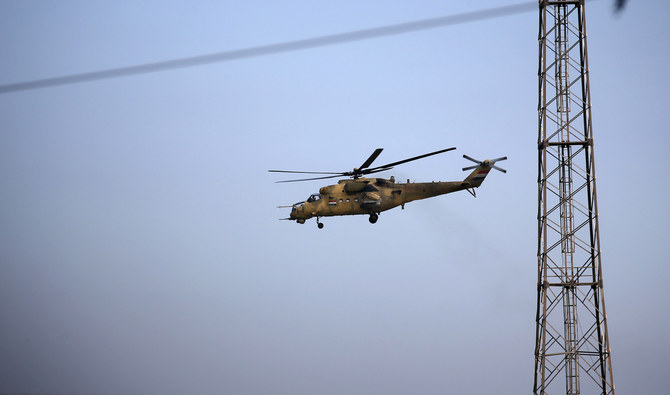BAGHDAD: The Iraqi government has been thrown into turmoil in a bitter row over moves by one of the leaders of Popular Mobilization Commission (PMC) to form its own air force directorate.
Efforts to restructure and institutionalize the PMC factions have exposed deep divisions between the head of the PMC, Falih Al-Fayyadh, and his deputy Abu Mahdi Al-Muhandis, one of the most powerful men in Iraq.
The PMC is a government body established by former Iraqi Prime Minister Nuri Al-Maliki in 2014 to provide an umbrella organization for armed factions and individuals who volunteered to fight Daesh alongside the Iraqi government after the Iraqi army collapsed and fled, leaving almost a third of the country’s territories in the north and west at the mercy of terrorists.
It consists of tens of thousands of fighters, most of whom come from pro-Iranian Shiite militias. Controlling an ideological, militarily armed combat force that equates to the armament of the Iraqi Army but not subject to the Iraqi government.
On Thursday, the PMC media circulated an official document signed by Al-Muhandis ordering the formation of an air force directorate linked exclusively to the PMC.
The order has been met with widespread political and popular criticism, as Iraq has had an air force since 1931 and opponents see no justification for setting up a new, similar, parallel force.
One prominent Shiite politician told Arab News that Al-Muhandis’ document represented a “flagrant” violation of the powers of the commander-in-chief of the Iraqi armed forces, and an open “challenge” to the authorities of the Iraqi government by the vice chairman of the PMC “who has no administrative or military powers to qualify to issue such orders.”
Muqtada Al-Sadr, one of the most powerful Shiite clerics in Iraq who controls the biggest parliamentary bloc and armed faction, has threatened to withdraw his support for Iraqi Prime Minister Adel Abdul-Mahdi’s government over the issue and put it at the mercy of “riots.”
In a tweet on Thursday evening, Al-Sadr said: “This is a declaration of the end of the Iraqi government and a transition from a state controlled by law to a state controlled by riots. If the government does not take firm actions (over Al-Muhandis’ order), I declare that I have nothing to do with it.”
Forty minutes after Al-Sadr had tweeted, Al-Fayyadh’s office issued a brief statement denying the authenticity of the formation of a special air command for the PMC.
It is not the first time in recent weeks that Al-Fayyadh and Al-Muhandis have issued conflicting statements. When Al-Muhandis said the PMC held the US responsible for bombing weapon depots in Iraq and would target its aircraft, Al-Fayyadh replied the next day saying Al-Muhandis’ statement represented his personal point of view and did not reflect the position of the Iraqi government or the PMC.
“The conflict within the body (PMC) has become a personal struggle between Al-Fayyadh and Al-Muhandis. The Iranians have nothing to do with it this time,” a senior commander of one of the PMC factions told Arab News.
“The man (Al-Muhandis) does not have any powers to issue such an order and this is known to all. He embarrassed himself, embarrassed the body (PMC) and embarrassed the Iranians. I find no explanation for this other than confusion, the man is angry and seeks to restore his powers within the body.”
Al-Muhandis or Jamal Jafaar, who was born in the Iraqi city of Basra in 1954, is wanted by several countries, including the US, France and Kuwait. He is one of the founders of the Popular Mobilization Units (PMU), and founder of numerous pro-Iranian armed factions, including Kata’ib Hezbollah-Iraq and Asaib Ahl Al-Haq, the most powerful Iraqi Shiite militias.
The funding and equipment provided by Iran to any armed Iraqi faction was only recommended by him in the years since 2003. He also controlled the monthly salaries paid by the Iraqi government to PMC fighters until 2016.
Al-Muhandis lost most of his tools to control the factions within the PMC after the end of military operations and efforts by former Iraqi premier Haider Abadi and then Abdul-Mahdi to regain control of the PMC and its fighters under international, regional and local pressure represented by the supreme authority in Najaf, Grand Ayatollah Ali Al-Sistani, leader of the Shiite community in Iraq.
“After approving the plan to structure and institutionalize the PMC factions, Najaf (Al-Sistani) explicitly demanded to neutralize Al-Muhandis and limit his powers,” a senior commander of PMC told Arab News.
“Al-Fayyadh demanded the restoration of his powers and refused to give up any of them to Al-Muhandis and Iran agreed to this. Al-Muhandis has become a burden on them (the Iranians) and acts contrary to their directions.”
Al-Muhandis, which means the engineer, still enjoys the support of many of the leaders of the armed factions inside and outside the PMC, and now openly challenges the Iraqi government, observers told Arab News.
His presence in the PMC has become a threat both to the commission and the government domestically and internationally, experts say. The US, other countries in the region, and most Iraqis now see him as undermining stability and security in Iraq.
“It could be said that Al-Muhandis has become almost a burning card (for the Iranians),” a senior commander of the Badr Organization, the biggest pro-Iran Shiite faction, told Arab News. “There is concern inside and outside the PMC of his usual quest to control a bloc within the body (PMC) that is not under the control of the government.
“The situation is sensitive and playing with fire is not in the interest of any party in Iraq. The fear of an outbreak of the situation prevented his (Al-Muhandis’) dismissal two weeks ago.”





















